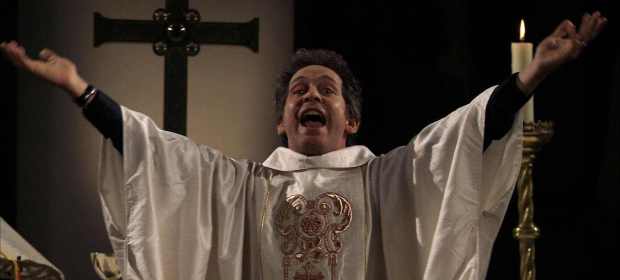Note: This article contains spoilers for John Michael McDonaugh’s film Calvary, Shūsaku Endō’s novel Silence, and the BBC TV show Rev.
When we encounter church leaders in novels, TV shows, movies, and other pieces of fiction, it can be tempting to wish for more flattering portrayals—more patient pastors, perhaps, with perfect congregations, or more saintly priests who shepherd with practiced ease.
In reality, though, we often meet men and women much like ourselves: put-upon leaders saddled with burdensome callings, facing down failure, barely holding it together. Like us, they minister both to and within a fallen world. Like us, they don’t always get it right.
And like us, they sometimes lose it. They flip out. They break down. The pressures of ministry catch up, and they are unable to cope. It can be painful to watch—even if a dose of warts-and-all honesty can still feel cathartic.
Flying in the face of that discomfort, however, are the words of German novelist Franz Kafka, who once wrote the following in a 1904 letter to his childhood friend Oskar Pollack:
I think we ought to read only the kind of books that wound and stab us. If the book we’re reading doesn’t wake us up with a blow on the head, what are we reading it for? . . . A book must be the axe for the frozen sea inside us.
If Kafka’s right, then that pain that we sometimes feel watching our imagined colleagues fall apart just might be a redemptive thing: a call to pay attention to their humanity, to take holy axes to ice-encased hearts. And if so, then that could affect what stories we consume. Perhaps the best stories for ministry leaders are not, in fact, those that portray us as bastions of righteousness or heroes of the faith, but as men and women who reach the point of coming undone—but come back.
Consider, for instance, these three moments in which the burden of ministry grows to be too much for three fictional leaders to bear:
1) Father James gets drunk and shoots up a pub in Calvary.

The premise of John Michael McDonagh’s 2014 film Calvary is harrowing. In the secrecy of the confessional, an unseen parishioner tells Father James Lavelle (played by the towering Brendan Gleeson) that he was sexually abused by a priest as a child, and that in one week he will avenge himself on the Church by murdering James—even though he knows him to be innocent. Under the shadow of this looming threat, James attempts to put his affairs in order, even as he continues ministering to his parishioners: the vast majority of whom are indifferent to his gospel and seem to take pleasure in flaunting their sins in front of him.
After a series of superhumanly patient—but mostly fruitless—attempts to help the men and women of his parish, Father James’s capacity for longsuffering starts to wear thin. Following a poison-tongued exchange in the town pub with his parish’s most vitriolic atheist, James begins a vigil in his booth, ordering drink after drink. When he’s told it’s time to go, he refuses, provoking an accusation of arrogance from a fellow patron: “You need to be a little more humble, Father.”
The charge is a slap in the priest’s face; his humility up to this point has been exemplary. James snaps. He pulls out a revolver from his cassock and holds the men in his crosshairs before turning and firing six rounds into the backbar.
Surprisingly, though, this momentary lapse turns to good for James and his ministry. At the film’s conclusion, as he throws the gun to the sea in a symbolic act of repentance, he’s met by one of his recalcitrant parishioners, now seeking earnest absolution. “I’m in a bad way, Father,” he confesses. “The truth is, I’ve been in a bad way for a long time.” As James proceeds to offer him comfort, he does so not as a shepherd to his wayward sheep, but as a fellow-sufferer who knows firsthand the weight of his sin and the ease of forgiveness.
Clearly, James’s conduct at the pub doesn’t fit his calling. The audience is meant to feel disquieted by it. But there’s also good cause for sympathy: James has endured unremitting suffering from the start of the film, with nary a moment to catch his breath. While he may be a priest, he is not Christ himself; he cannot endure his Gethsemane alone. Neither can we.
2) Fr. Rodrigues tramples on the face of Christ in Silence.
Shūsaku Endō’s masterpiece Silence—the story of fictional Jesuit missionary Sebastião Rodrigues and his failed mission to 17th-century Japan—is a challenging novel in many respects. It’s dense. It’s ambiguous. It’s profoundly troubling. But it has also won recognition for containing what is perhaps one of the most honest portraits of ministerial suffering in the whole literary tradition.
At the novel’s outset, Rodrigues sets out for Japan to minister to its beleaguered underground church and discover the fate of his mentor, who is rumored to have apostatized under the threat of persecution. He anticipates difficulty—the Japanese authorities, after all, are violently opposed to Christianity—but ends up facing even more trial and tribulation than he could have expected.
After a relentless run of devastating losses and setbacks, Rodrigues is eventually captured and presented with an ultimatum. Either he must renounce his faith by trampling on a fumie—a carved image of Christ used as a litmus test to reveal suspected Christians—or watch as his fellow Christians are mercilessly and ingloriously martyred on his behalf. Wracked by his dilemma, he only finds relief when he imagines the voice of Christ speaking from the fumie: “Trample! Trample! I more than anyone know of the pain in your foot. Trample! It was to be trampled on by men that I was born into this world. It was to share men’s pain that I carried my cross.”
For the minister, it’s hard to imagine a more piercing pain than that which would follow a symbolic denial of one’s faith. Endō’s novel, however, doesn’t allow its readers to either glorify Rodrigues for his self-sacrifice or vilify him for his lack of fortitude. Instead, it directs our gaze to Christ, whose suffering at the hands of men parallels our own. In the end, Rodrigues reflects that “he loved [the Lord] now in a different way from before. Everything that had taken place until now had been necessary to bring him to this love.” His realization is a gripping reminder that even our most spectacular failures, our most flagrant exhibitions of faithlessness in the midst of frustration, cannot disarm God’s grace.
3) Rev. Adam Smallbone butchers a Christmas service on Rev.

If you haven’t seen Rev., the BBC’s sitcom about blundering big-city vicar Adam Smallbone and his scrappy London flock, you really ought to look it up on Hulu—as I’ve argued elsewhere, it’s one of the most unflinching (if occasionally irreverent) portraits of church life I’ve ever seen on television. And part-and-parcel of that honesty is that the Reverend Smallbone himself can, like the best of us, be a bit of a dolt—especially when the pressure is on.
One of the most memorable episodes from the series’ three-season run is the finale of Season 2, which takes place during Adam’s first Advent in London. The pressures of Christmastime ministry are exacerbated by a series of both foibles and failures, including a petulant father-in-law’s unwelcome visit, a black eye at the hand of a spurned friend, and—most devastatingly—Adam’s absence at the deathbed of a beloved parishioner.
The storm of blows culminates when his Christmas Eve service is overrun by a crowd of impudent and drunken Yuletide drop-ins. When they interrupt his service with kazoos, confetti poppers, and bouts of ale-slurred caroling, he cracks, launching into a grievance-laden rendition of “The Twelve Days of Christmas” (“ten office parties, five thousand mince-pies, forty-five hospital visits, one multi-faith ecumenical event, two . . . much to do!”) and dancing a frenetic jig before the altar to a chorus of “Mince pies! Mince pies!” It’s a spectacle of discomposure that would make even The Office’s Michael Scott wince in embarrassment.
In the morning light of Christmas, however, the memory of Adam’s exhibition quickly fades. The reverend’s irreverence, which seemed so unforgettable the night before, is quickly forgotten as his congregation gathers to feast, momentarily forming a pastiche tableau of da Vinci’s The Last Supper around their longsuffering shepherd.
The iconic image of Jesus’ final meal before the Crucifixion is a fitting touchstone for all these stories. In it, after all, are the Son of Man’s followers—ministers in their own right—who before long will betray, deny, and desert him. They are caught up in their quibbling, trying to discover which one of them is the turncoat, the embarrassment to the faith.
Only Jesus, the consummate priest whose ministry is about to culminate in an act of tremendous sacrifice and suffering, looks down at the table. His hand gestures toward the bread, his flesh about to be broken. His palm proffers forgiveness. His eye is not on the traitor. It’s on the feast.











